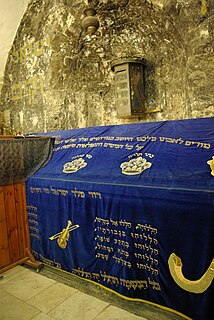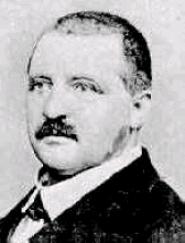
Helgoland, WAB 71, is a secular, patriotic cantata for male choir and orchestra, composed by Anton Bruckner in 1893. Since Bruckner did not complete the 9th symphony, Helgoland is his last complete work.

Psalm 150 is the 150th and final psalm of the Book of Psalms, generally known in English by its first verse, in the King James Version, "Praise ye the LORD. Praise God in his sanctuary". In Latin, it is known as "Laudate Dominum in sanctis eius". In Psalm 150, the psalmist urges the congregation to praise God with music and dancing, naming nine types of musical instruments. For this reason it is also called "the musicians' psalm". The Book of Psalms is the third section of the Hebrew Bible, and a book of the Christian Old Testament. In most versions of the Bible, the Book of Psalms has 150 psalms and Psalm 150 is the final one. However, that is not the case in the Eastern Orthodox and Syriac Orthodox canons, which have 151 and 155 psalms respectively.

The Mass No. 2 in E minor, WAB 27, by Anton Bruckner is a setting of the mass ordinary for eight-part mixed choir and fifteen wind instruments.

The Requiem in D minor, WAB 39, is a Missa pro defunctis composed by Anton Bruckner in 1849.

Anton Bruckner's Psalm 150, WAB 38, is a setting of Psalm 150 for mixed chorus, soprano soloist and orchestra written in 1892.

The Missa solemnis, WAB 29, is a solemn mass composed by Anton Bruckner in 1854 for the installation of Friedrich Mayer as abbot of St. Florian Abbey on 14 September 1854.

Psalm 146 in A major by Anton Bruckner is a psalm setting for double mixed choir, soloists and orchestra. It is a setting of verses 1 to 11 of a German version of Psalm 147, which is Psalm 146 in the Vulgata.

Bruckner's Psalm 22, WAB 34, is a setting of a German version of Psalm 23, which was psalm 22 in the Vulgata.

Bruckner's Psalm 114, WAB 36, is a psalm setting of verses 1 to 9 of a German version of Psalm 116, which is Psalm 114 in the Vulgata.

Bruckner's Psalm 112, WAB 35, is a psalm setting for eight-part double mixed choir and full orchestra. It is a setting of a German version of Psalm 113, which is Psalm 112 in the Vulgata.

The Mass No. 1 in D minor, WAB 26 by Anton Bruckner, is a setting of the Mass ordinary for soloists, mixed choir and orchestra, and organ.

The Messe für den Gründonnerstag, WAB 9, is a missa brevis composed by Anton Bruckner in 1844.
Matthew Best is an English bass singer and conductor, especially of vocal music. He founded the ensemble Corydon Singers in 1973 and won the Kathleen Ferrier Award in 1981. From 1985, he was also a guest conductor of the English Chamber Orchestra. His recordings with Corydon Singers were made on the Hyperion Records label and focus on choral music by the likes of Anton Bruckner, Johannes Brahms and Felix Mendelssohn. He is currently engaged as Music Director of the Academy Choir Wimbledon and as a Principal Study singing teacher at the Royal Northern College of Music.

Os justi, WAB 30, is a sacred motet composed by Anton Bruckner in 1879. Os Justi is a Gregorian chant used as gradual of the Commune Doctorum, and as introit I and gradual II of the Commune Confessoris non Pontificis.

Inveni David, WAB 19, is a sacred motet composed by Anton Bruckner in 1868.

Psalm 150 is a psalm setting by César Franck. He wrote the composition, setting Psalm 150 for four-part choir, orchestra and organ, in 1883. It was published in 1896 by Breitkopf & Härtel. Carus-Verlag published an arrangement for choir, strings and organ. The incipit in French is "Halleluiah! Louez le Dieu, caché dans ses saints tabernacles".
This page is based on this
Wikipedia article Text is available under the
CC BY-SA 4.0 license; additional terms may apply.
Images, videos and audio are available under their respective licenses.







